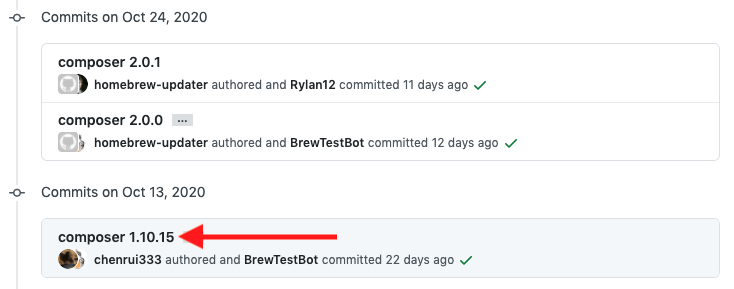

- #Brew cask search packages how to#
- #Brew cask search packages mac os x#
- #Brew cask search packages update#
- #Brew cask search packages software#
Are you planning on developing iOS or Mac applications?.The solution depends on your answer to this question:
#Brew cask search packages how to#
If you came here looking how to install Xcode using brew (aka Homebrew), read this part first. Personally, I use Apple's clang/clang++ compilation tools rather than deal with GNU gcc. The gcc application will be installed by default in /usr/local/bin. # In the bash shell (e.g.bash_profile), gag Google Analytics in Homebrew.īrew cleanup (this removes previous application/dependency revisions saving considerable space) After you initially install homebrew (brew): That compilation process will take at least an hour. homebrew) to install, and compile GCC and all of its dependencies. If you have the most recent Apple Command Line Tools (macOS 10.nn) for Xcode installed for your operating system version - which you get from /download/more, then you need a package manager (e.g. If you like, everything can be scripted as well: Run the macOS installer: startosinstall Run all macOS updates for Xcode, etc.
#Brew cask search packages update#
Brew update will update the list of available formulae, and brew upgrade will upgrade any outdated packages. Run brew update & brew upgrade every once in a while (and you can do it after upgrading macOS). GCC can be obtained by downloading Xcode, the smaller Command Line Tools (must have an Apple account) or the even smaller OSX-GCC-Installer package. Before installing Python, you’ll need to install GCC.
#Brew cask search packages mac os x#
And, since Mac OS X is now home to Windows-style installer crapware, Homebrew Cask is a way around that.Doing it Right¶. They can avoid all the downloading DMG files and clicking around.
#Brew cask search packages software#
This is a shame, because - while we geeks love easy terminal utilities - many people could benefit from easy software installation on Mac OS X. Unfortunately, there’s no graphical user interface for Homebrew Cask. Not every graphical application or Unix utility you’re looking for will be available, but most of them probably will be.


To remove that package from your system later: brew remove nameįor more details on using these commands, read the Homebrew Cask Usage guide or the Homebrew brew command manual on their official websites. To download and install that package: brew install name To search for a utility: brew search name Like Homebrew Cask, it uses simple commands. It’s the easiest way to install them on Mac OS X, just as it is on Linux. The Homebrew command is the underlying package manager that installs all those UNIX and open-source utilities you might want. Install Open-Source Utilities With Homebrew To uninstall an app with Homebrew Cask, run the following command: brew cask uninstall name Homebrew Cask will automatically download it, extract the app, and install it to your Applications folder. To install an app, run the following command. To search for one, use the following command: brew cask search name Now you can get started installing those graphical apps you want. Install Graphical Apps With Homebrew Cask It uses Homebrew to install Cask: brew install caskroom/cask/brew-cask Once you’re done, run the following command to install Homebrew Cask. Homebrew Cask is now automatically installed as part of Homebrew itself. UPDATE: The below command is no longer necessary. Run the following command once you’re done to ensure Homebrew is installed and working properly: brew doctor By default, it installs Homebrew so you can use the brew command without typing the sudo command and providing your password. Press Enter and then provide your password to install it. if you run the ruby script using the command above, it will ask you to run the following command: /bin/bash -c "$(curl -fsSL )" Update: Run the following command instead.


 0 kommentar(er)
0 kommentar(er)
